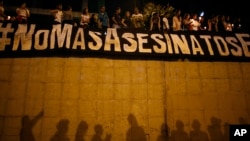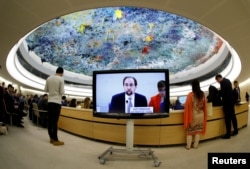The United Nations human rights chief said on Monday that Venezuelan security forces may have committed crimes against humanity against protesters and called for an international investigation.
But Venezuela's foreign minister defended the record of the government of President Nicolas Maduro, rejecting the allegations as "baseless."
Venezuela has been convulsed by months of demonstrations against the leftist president who critics say has plunged the oil-rich country into the worst economic crisis in its history and is turning it into a dictatorship.
"My investigation suggests the possibility that crimes against humanity may have been committed, which can only be confirmed by a subsequent criminal investigation," Zeid Ra'ad al Hussein told the U.N. Human Rights Council.
He said the government was using criminal proceedings against opposition leaders, arbitrary detentions, excessive use of force and ill-treatment of detainees, in some cases amounting to torture.
Last month, Zeid's office said Venezuela's security forces had committed extensive and apparently deliberate human rights violations in crushing anti-government protests and that democracy was "barely alive."
"There is a very real danger that tensions will further escalate, with the government crushing democratic institutions and critical voices," Zeid said.
The opposition, which boycotted the election for the Constituent Assembly, has accused electoral authorities of inflating turn-out figures for the July 30 vote.
However, Foreign Minister Jorge Arreaza told the Geneva forum: "We have now selected the National Constituent Assembly, this is the true expression of our citizens' will. It will have the powers to draw up a new Constitution."
"The opposition in Venezuela is back on the path of rule of law and democracy, we will see dialogue emerging thanks to mediation of our friends," he said.
Arreaza accused protesters of using firearms and "home-made weapons" against security forces, but noted that the last death was on July 30. "Our country is now at peace," he added.
Venezuela is among the 47 members of the Council, where it enjoys strong support from Cuba, Iran and other states.
Diego Arria, who was Venezuela's ambassador to the United Nations in New York from 1991 to 1994, told a separate Geneva event organized by activists and action group UN Watch that Venezuela should be referred to the prosecutor of the International Criminal Court.
"I am convinced that the killing in the streets equates to crimes against humanity," he said. The Hague-based court defines such crimes as including torture, murder, deprivation of liberty, sexual violence and persecution, he said.
Julieta Lopez, aunt of opposition leader Leopoldo Lopez who remains under house arrest after three years in a military jail, said abuses continued.
"There is no right to express a different political opinion without being threatened, beaten or imprisoned," she told the same event.






